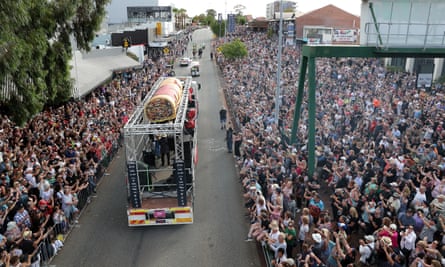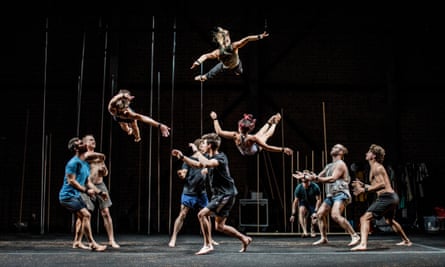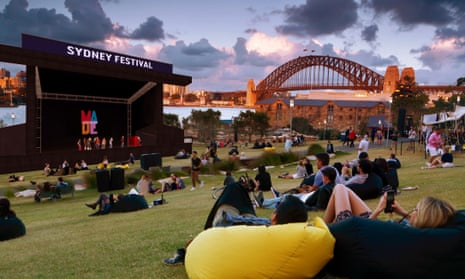Covid-19 has thrown huge challenges at Australia’s major arts festivals this summer, not least the maintenance of audience physical distancing at crowded events and border closures excluding most international artists.
To mitigate the risk of viral spread this January, Sydney festival will build a large stage for several shows at the Barangaroo headland, where the festival stages Vigil each year, designed to keep people seated at safe distances. “Our surveying says people feel that being outdoors is safer,” artistic director Wesley Enoch says.
At Perth festival, held in February, artistic director Iain Grandage says large scale events of previous years such as Highway to Hell and Boorna Waanginy will not be possible due to Covid-19. “These things where you have 100,000-plus people cheek-by-jowl and non-contact-traceable are simply untenable,” he says.
Meanwhile, the Covid-19 outbreak in Adelaide in mid-November has forced the Adelaide festival to indefinitely delay releasing details of its full program, which it had planned to launch on 19 November. “We are so disappointed that we can’t reveal our program this week and can’t wait to share it with you as soon as we can,” says the festival’s executive director, Elaine Chia.
The delay in announcing Adelaide’s program comes amid difficulty in recent weeks on settling on a venue for the opening night concert on 27 February because of Covid safety concerns, with the projected audience cut from 6,000 to 3,500 even before the recent Adelaide outbreak.
Masks will not be mandated at Sydney, Perth or Adelaide festivals, although they will be recommended and available at Sydney festival venues. Perth, where community transmission of the virus has been virtually eliminated, will also not require compulsory masks at festival shows. Likewise, says Adelaide festival, at the time of writing. “At this stage SA Health is not advising people wear masks,” a festival spokeswoman said, adding she could not confirm if masks would be made available at shows.
Adelaide festival: delayed announcement and uncertainty
The Adelaide festival still plans to buck the locals-only trend and bring several international guests from the US and the UK on sub-class 408 temporary activity visas, paying for their 14-day quarantine in Australia before performances, and taking responsibility for the artists remaining in the state.

Among those artists already announced are Londoner Denni Sayers, who was scheduled to choreograph the Benjamin Britten opera A Midsummer Night’s Dream at Adelaide Festival Centre, playing to 50% audience capacity, and San Francisco-based countertenor Aryeh Nussbaum Cohen, who will play Oberon in the opera.
Adelaide festival “lives with uncertainty and a lot of crossed fingers this will all come off,” co-director Rachel Healy says. The 408 visas, allowing a stay in Australia up to three months, can be requested no earlier than three months before the artist’s arrival, making planning the program tricky. Each artist requires a statutory declaration about their critical skills. The South Australian premier, Steve Marshall, has written letters of recommendation for them, submitted to the commonwealth’s Border Force agency.
Healy and co-director Neil Armfield, contracted to run Adelaide festival until 2023, sparked criticism in the past for programming predominantly international productions. Covid-19 restrictions necessitate a more Australian festival in 2021, after the postponement of a major show involving artists from 14 African countries, as well as works from Israel, Lebanon, Scandinavia, Spain, Canada, Russia, Switzerland and Bulgaria.
The pan-African show posed challenges with Covid-19 testing regimes because some African countries could not meet airline requirements of providing test results within three days of departure. “The cost of quarantining those [African] artists alone was $160,000,” says Healy, declining to name the show. “A $3m hole has been blown in our budget as a consequence of 50% [audience] capacity, so that kind of money is just not possible.”
Sydney festival: ‘We’re expecting a very wet January’
Sydney festival, which will be almost all Australian, will host one artist on a 408 visa, the Irish actor Olwen Fouéré, who will appear in the local Force Majeure show The Last Season. A Māori creative team taking part in Nathan Maynard and Jamie McCaskill’s premiere play Hide the Dog will come to Sydney in the trans-Tasman travel bubble.
The stage to be built at the Barangaroo headland for Sydney festival will measure 32m by 18m, complete with a proscenium, on which Sydney-based Bangarra Dance Theatre will perform Spirit: A Retrospective 2021, a series of highlights from 31 years of performances, and where Adelaide circus company Gravity and Other Myths will premiere a new show, The Pulse, both over five nights.

The Covid-safe audience capacity at the Barangaroo headland is 1,500 per show, with tickets $25 each, although the shows will be live-streamed for free. “Our initial reaction was we should do it free but under Covid restrictions you actually have to ticket everyone who comes into the site,” says Enoch. “Free attendance is often volatile, so by charging a nominal fee, you are likely to turn up. It’s about ticketing and making sure people sit in the right spots.”
The climate poses its own challenges. “We’ve committed to a lot of outdoor activities, which is great except a La Niña effect is about to hit us,” says Enoch. “So we’re expecting a very wet January.”
One advantage of the travel limitations is that companies often touring internationally are available to perform locally, such as Gravity and Other Myths, as well as the Brisbane-based circus company Circa, which will present a new iteration of Humans at Sydney festival.
Bangarra Dance Theatre had been planning to create a brand new show opening at Sydney festival, especially to celebrate Enoch’s final festival, and then touring to Perth and Adelaide. But artistic director Stephen Page says the stricter audience limits in NSW during planning stages created uncertainty and affected projections for the show’s financial viability, so they opted for the retrospective instead. Page declines to name the show, and says it remains “in talks”.
The retrospective meanwhile will not travel to Perth due to border restrictions or to Adelaide festival, as Bangarra is scheduled to begin rehearsals on another show, SandSong, in March. Planned for 2020, SandSong was postponed due to the pandemic and will now premiere at Sydney Opera House in June 2021.
Perth festival: a West Australian-only lineup
Perth festival again emphasises a strong Indigenous lineup as with Iain Grandage’s first program in 2020, with Noongar writer and actor Kylie Bracknell continuing as artistic associate. The program includes Witness Stand, a music and spoken word attraction along six contested sites of the Derbari Yerrigan or Swan River; Fist of Fury, a Noongar dubbing of a Bruce Lee film; and Yirra Yaakin Theatre company’s all-First Nations cast version of the play The Sum of Us, which became a 1994 feature film.
Meanwhile, City of Lights will be a free family event around the Perth Cultural Centre. 360-degree projections with a “Bilya” or river theme will be beamed hourly on to the buildings. Festival staff will aim to ensure physical distancing each night. “Essentially we’ve built it so there are no points of constriction [such as] where there are audiences coming from opposite directions and then you can have a crush, which by its very nature is not Covid-safe,” says Grandage.
Confining itself to just West Australian-based artists, the festival is still premiering 10 commissions in theatre and dance, four in classical music and 30 in visual arts. In addition, Perth-raised but Sydney-based Tim Minchin, who will “go into quarantine if he has to”, will premiere his new album Apart Together with the West Australian Symphony Orchestra in Kings Park.
Grandage hopes the state border will open by Christmas. “There’s no sense of parochialism in delivering our West Australian-only festival,” he says. “In telling the stories of this place, there’s been an absolute sense of making sure we keep the issues of the world completely in our focus.”
